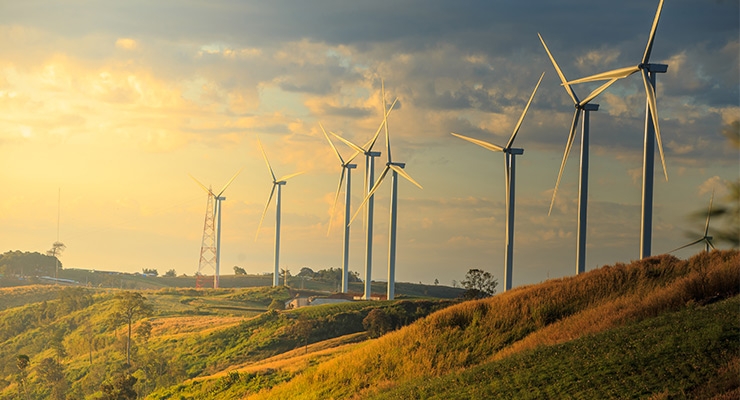09.14.17
Kimberly-Clark Corporation has made its first major commitment to renewable energy with agreements to annually purchase approximately 1,000,000 megawatt hours (245 megawatts - MW) of electricity from two new wind power projects in Texas and Oklahoma. The renewable energy supplied by the wind farms is equivalent to about one-third of the electricity needs of Kimberly-Clark’s North American manufacturing operations and will enable the company to surpass its greenhouse gas (GHG) reduction goal four years earlier than anticipated.
Kimberly-Clark has entered long-term power purchase agreements to take 120 MW or 78 per cent of electricity to be generated by the Rock Falls Wind project being developed by EDF Renewables in northern Oklahoma and 125 MW or 42% of the electricity to be generated by the Santa Rita Wind Energy Center being built by Invenergy in West Texas. The renewable energy supplied by the two wind farms will enable Kimberly-Clark to reduce its greenhouse gas emissions by up to 550,000 metric tons annually. This is equivalent to removing 116,178 passenger vehicles from the road or not burning nearly 600 million pounds of coal annually.
“These agreements mark Kimberly-Clark’s first use of utility-scale renewable energy and are a step-change in our energy and climate strategy to reduce climate change impacts, improve operating efficiency and benefit cost savings,” says Lisa Morden, global head of Sustainability at Kimberly-Clark.“Adding wind-generated electricity to the energy mix will enable the company to achieve more than a 25% reduction in GHG emissions in 2018, which is four years ahead of the original 2022 target to reduce absolute greenhouse gas emissions by 20% from 2005 levels.
“These two renewable energy projects, combined with a number of other energy initiatives across the company, put Kimberly-Clark on-track to deliver significant multimillion dollar cost savings from energy and climate projects by 2022,” Morden adds. “It’s a powerful demonstration of sustainability initiatives having both great environmental and business benefits.”
These two renewable energy projects build on extensive work undertaken by Kimberly-Clark to reduce its carbon footprint and create business value through greater energy efficiency, conservation and alternative energy programs including:
— Six large-scale electricity cogeneration facilities with waste heat recovery, including a seventh project recently announced and under construction at the company’s Mobile, Alabama manufacturing facility (due to start-up in 2019).
— Four biomass thermal energy generating plants that provide steam for the company’s tissue operations.
— More than 350 energy initiatives completed by the company across its operations since 2015.
The Rock Falls Wind project will become operational by the end of 2017, and the Santa Rita facility is expected to begin commercial operation by the second quarter of 2018. Renewable Choice Energy helped broker the two agreements.
To support the growth of renewable energy sources, Kimberly-Clark has signed onto the Corporate Renewable Energy Buyers’ Principles, a collaboration of leading companies seeking simplified access to the renewable electricity to meet their clean and low-carbon energy goals.
“We used the Renewable Energy Buyers’ Principles when evaluating the business case for pursuing the offtake of utility-scale renewable energy with the EDF and Invenergy projects. Therefore, it was a natural but significant step for us to formally sign on and publicly endorse the Renewable Energy Buyers’ Principles,” says Stewart Van Horn, director of Global Energy Solutions at Kimberly-Clark.
The Buyers’ Principles tell utilities and other suppliers what industry-leading, multinational companies are looking for when buying renewable energy from the grid. The project is facilitated by World Resources Institute and World Wildlife Fund.
Kimberly-Clark has entered long-term power purchase agreements to take 120 MW or 78 per cent of electricity to be generated by the Rock Falls Wind project being developed by EDF Renewables in northern Oklahoma and 125 MW or 42% of the electricity to be generated by the Santa Rita Wind Energy Center being built by Invenergy in West Texas. The renewable energy supplied by the two wind farms will enable Kimberly-Clark to reduce its greenhouse gas emissions by up to 550,000 metric tons annually. This is equivalent to removing 116,178 passenger vehicles from the road or not burning nearly 600 million pounds of coal annually.
“These agreements mark Kimberly-Clark’s first use of utility-scale renewable energy and are a step-change in our energy and climate strategy to reduce climate change impacts, improve operating efficiency and benefit cost savings,” says Lisa Morden, global head of Sustainability at Kimberly-Clark.“Adding wind-generated electricity to the energy mix will enable the company to achieve more than a 25% reduction in GHG emissions in 2018, which is four years ahead of the original 2022 target to reduce absolute greenhouse gas emissions by 20% from 2005 levels.
“These two renewable energy projects, combined with a number of other energy initiatives across the company, put Kimberly-Clark on-track to deliver significant multimillion dollar cost savings from energy and climate projects by 2022,” Morden adds. “It’s a powerful demonstration of sustainability initiatives having both great environmental and business benefits.”
These two renewable energy projects build on extensive work undertaken by Kimberly-Clark to reduce its carbon footprint and create business value through greater energy efficiency, conservation and alternative energy programs including:
— Six large-scale electricity cogeneration facilities with waste heat recovery, including a seventh project recently announced and under construction at the company’s Mobile, Alabama manufacturing facility (due to start-up in 2019).
— Four biomass thermal energy generating plants that provide steam for the company’s tissue operations.
— More than 350 energy initiatives completed by the company across its operations since 2015.
The Rock Falls Wind project will become operational by the end of 2017, and the Santa Rita facility is expected to begin commercial operation by the second quarter of 2018. Renewable Choice Energy helped broker the two agreements.
To support the growth of renewable energy sources, Kimberly-Clark has signed onto the Corporate Renewable Energy Buyers’ Principles, a collaboration of leading companies seeking simplified access to the renewable electricity to meet their clean and low-carbon energy goals.
“We used the Renewable Energy Buyers’ Principles when evaluating the business case for pursuing the offtake of utility-scale renewable energy with the EDF and Invenergy projects. Therefore, it was a natural but significant step for us to formally sign on and publicly endorse the Renewable Energy Buyers’ Principles,” says Stewart Van Horn, director of Global Energy Solutions at Kimberly-Clark.
The Buyers’ Principles tell utilities and other suppliers what industry-leading, multinational companies are looking for when buying renewable energy from the grid. The project is facilitated by World Resources Institute and World Wildlife Fund.








